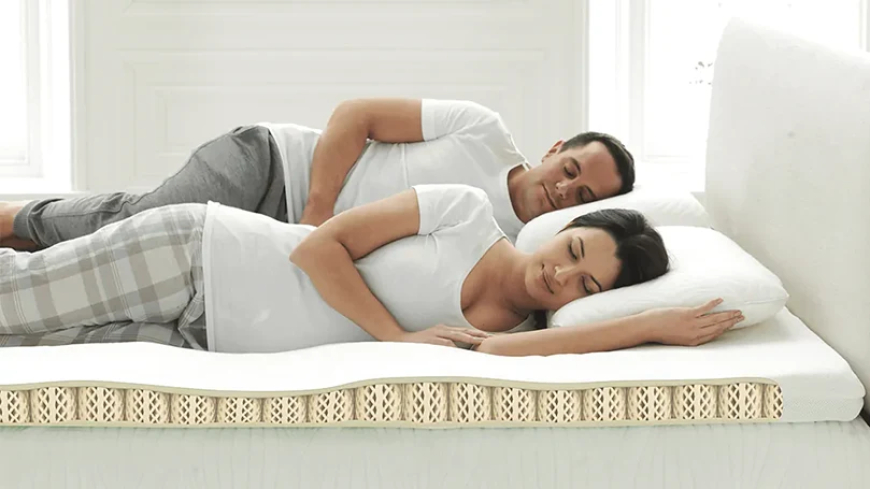Is Your Mattress Ruining Your Sleep and Spinal Health? Signs You Need a Change
Is your mattress affecting your sleep and spinal health? Learn how to choose the right mattress for better posture, pain relief, and quality rest.

Have you ever woken up feeling stiff, sore, or more tired than when you went to bed? If so, your mattress could be the culprit. Many people overlook the impact a mattress has on sleep quality and spinal health. An unsupportive or worn-out mattress can lead to poor posture, back pain, and restless nights, affecting overall well-being.
In this article, we’ll explore how your mattress influences sleep and spinal alignment, the signs that it’s time for a replacement, and how to choose the best mattress for your needs.
How Your Mattress Affects Sleep and Spine Health
Your spine has a natural S-shaped curve, and a good mattress should support this alignment while relieving pressure points. A poor mattress can create uneven support, leading to back pain, stiffness, and even long-term spinal issues.
Here’s how your mattress can impact your body:
- Spinal Alignment: A mattress that is too soft or too firm can misalign the spine, leading to discomfort.
- Pressure Points: An old or sagging mattress can put pressure on areas like the shoulders, hips, and lower back.
- Sleep Quality: An uncomfortable mattress can cause tossing and turning, disrupting deep sleep (REM and slow-wave sleep), which is crucial for physical recovery.
- Muscle Recovery: Your body repairs itself during sleep. If your mattress doesn’t provide the right support, your muscles may remain tense, leading to soreness.
Signs Your Mattress Needs Replacing
Not sure if your mattress is affecting your sleep and spine? Here are some red flags to watch out for:
-
You Wake Up with Pain or Stiffness
- If you consistently wake up with back, neck, or shoulder pain, your mattress may no longer be providing adequate support.
-
Your Mattress Has Visible Sagging or Lumps
- Over time, mattresses lose their shape and start sagging, creating an uneven surface that throws off spinal alignment.
-
You Toss and Turn All Night
- If you struggle to find a comfortable position or frequently shift throughout the night, your mattress may be causing discomfort.
-
You Feel Tired Despite Sleeping Enough
- Poor mattress support can prevent deep sleep, leading to fatigue even after a full night's rest.
-
Your Mattress Is 7-10 Years Old
- Most mattresses last 7–10 years before they start losing support. If yours is older, it might be time for an upgrade.
-
You Sleep Better on Other Beds
- If you sleep better in a hotel or on a different mattress, it's a strong sign that your current one isn’t right for you.
Choosing the Right Mattress for Spinal Health
If your mattress is causing sleep issues, here’s how to find a replacement that supports both your sleep quality and spine health.
1. Consider Your Sleeping Position
Your preferred sleeping position determines the level of firmness you need:
- Back Sleepers: Medium-firm mattresses help maintain spinal alignment.
- Side Sleepers: Softer mattresses relieve pressure on the shoulders and hips.
- Stomach Sleepers: Firmer mattresses prevent excessive sinking, keeping the spine neutral.
2. Look for Spinal Support and Pressure Relief
A good mattress should:
✔ Support the natural curvature of your spine.
✔ Distribute body weight evenly.
✔ Reduce pressure on the lower back, shoulders, and hips.
3. Choose the Right Mattress Type
There are various mattress types, each with different benefits:
- Memory Foam: Molds to the body and relieves pressure but may retain heat.
- Innerspring: Offers strong support but may lack contouring.
- Hybrid: A mix of memory foam and innerspring, providing both support and comfort.
- Latex: Natural and durable, offering both support and breathability.
4. Test the Mattress Before Buying
If possible, test a mattress in-store or look for brands that offer a trial period (at least 90 days) to ensure it suits your body.
Additional Tips for Better Sleep and Spine Health
- Use a Supportive Pillow: The right pillow keeps your neck aligned with your spine.
- Check Your Sleeping Posture: Avoid slouching or twisting while sleeping.
- Rotate Your Mattress: Rotate every 3–6 months to prevent sagging.
- Invest in a Good Bed Frame: A strong foundation prevents mattress sagging and extends its lifespan.
Conclusion
Your mattress plays a huge role in sleep quality and spinal health. If you’re waking up sore, tossing and turning, or sleeping better elsewhere, it may be time for an upgrade. Choosing the right mattress can improve your posture, reduce pain, and enhance sleep quality, leading to better overall health.
Prioritize comfort and support—your spine will thank you!
What's Your Reaction?
 Like
0
Like
0
 Dislike
0
Dislike
0
 Love
0
Love
0
 Funny
0
Funny
0
 Angry
0
Angry
0
 Sad
0
Sad
0
 Wow
0
Wow
0



















































